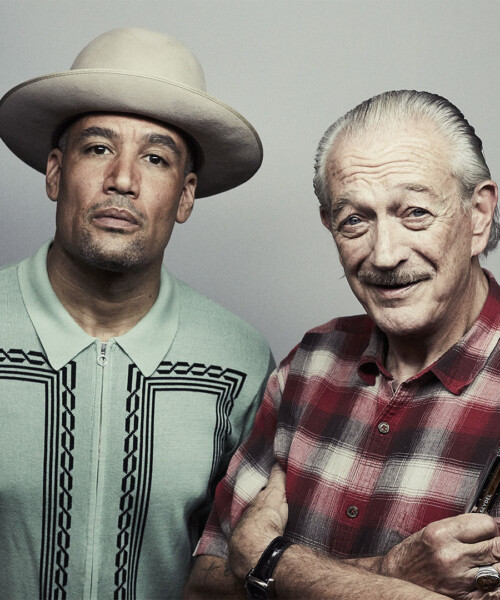Having yielded a dozen albums and three Grammys, Ben Harper’s voice—confident and velvety—personifies a life of musical discovery. When we catch up on the phone, the singer-songwriter tells me about the early years of his career spent chasing down blues legends like Louis Myers of The Aces, Brownie McGhee and John Lee Hooker in the hopes of honing his craft. “[Blues recording artist] Taj Mahal plucked me from obscurity and put me in his band,” Harper says of his musical roots. “I think at the time, the cats were excited to see a young, black, wide-eyed blues player. There was something in the water that made blues players take care of its own in a very specific way. It was a real privilege,” he recalls.
Since his days of knocking on artist’s doors, Harper has used his varied influences to create a musical sound all his own. “I’ve heard that if I had a more consistent sound I’d be more successful but the praise and criticism doesn’t make me. I’ve never felt like I had to serve a sound, I’ve always felt I had to serve my instincts and serve the song,” he explains. “Eclecticism is my stock and trade. That’s what I do and that’s what I’ve always done.”
While over the years he has experimented with everything from hip-hop to gospel, it’s hard to imagine Harper’s music without his early blues influences. On his latest album, No Mercy In This Land, Harper has made a natural return to his roots with friend and blues legend Charlie Musslewhite by his side, creating what he hopes to be a fresh contribution to the genre. “Everything I do is one shade of blue or another because it was the original art form for me,” he says. “It would be great if this album could be a modern contribution to the blues, with a foot firmly planted in tradition,” he adds.
Harper and Musslewhite first teamed up in 2013 on Get Up, an album Harper describes as being his first “pure, straight-up, bare bones” blues record. Since then, the two have nurtured their creative relationship, one Harper, who has collaborated with the likes of Relentless7, The Innocent Criminals and even the Dixie Chicks, says he values above all. “Having Charlie at the center of the circle to apply my songwriting instincts to gives me a benchmark and something to aim for,” Harper says. “It’s higher than I would aim for my own material.”
While Harper says the collaboration has “made me a better instrumentalist,” he says No Mercy In This Land could very well be his last record released in a traditional format. “When was the last time you bought a CD,” he asks me, as if to justify his position. When I respond that I don’t remember, unless you’re counting vinyl, Harper lets out a belly laugh. “Isn’t it funny that I’d sound more up-to-date if I asked about vinyl? Hilarious.”
No matter what form Harper’s music may take in the future, he says that, following the release of No Mercy In This Land, he can look back on his eclectic career with a sense of satisfaction. “If this is my full-length swan song, I’m thrilled,” he says. “I couldn’t be more proud of one.”







































